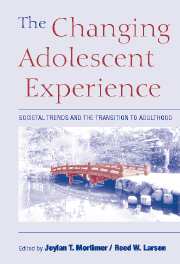Book contents
- Frontmatter
- Contents
- List of Contributors
- Preface
- 1 Macrostructural Trends and the Reshaping of Adolescence
- 2 Youth in Aging Societies
- 3 The Transition from School to Work
- 4 Criminal Justice in the Lives of American Adolescents: Choosing the Future
- 5 Adolescent Health Care in the United States: Implications and Projections for the New Millennium
- 6 Youth and Information Technology
- 7 Social Space, the Final Frontier: Adolescents on the Internet
- 8 Approaching Policy for Adolescent Development in the 21st Century
- Index
- References
1 - Macrostructural Trends and the Reshaping of Adolescence
Published online by Cambridge University Press: 06 January 2010
- Frontmatter
- Contents
- List of Contributors
- Preface
- 1 Macrostructural Trends and the Reshaping of Adolescence
- 2 Youth in Aging Societies
- 3 The Transition from School to Work
- 4 Criminal Justice in the Lives of American Adolescents: Choosing the Future
- 5 Adolescent Health Care in the United States: Implications and Projections for the New Millennium
- 6 Youth and Information Technology
- 7 Social Space, the Final Frontier: Adolescents on the Internet
- 8 Approaching Policy for Adolescent Development in the 21st Century
- Index
- References
Summary
The paths adolescents take from childhood into adulthood are shaped by broad demographic, institutional, and technological forces. In the next century, these societal forces may affect adolescent experience in ways that facilitate and enhance youth's preparation to become healthy adults or in ways that leave youth unprepared, even handicapped, for adulthood. Knowledgeable projections about how adolescent experience and preparation for adulthood are likely to be transformed in the future are vital for shaping agendas for research; for alerting educators, policy makers, and practitioners to new realities; and for formulating thoughtful responses to emerging dilemmas. This volume focuses on key societal phenomena that will influence the experience of adolescence in the future: demographic and economic trends, innovations in information technology, and alterations in key social institutions including those concerned with education, work, health care, and criminal justice.
Some ominous societal changes of the 21st century are addressed. Rapid population growth in some regions of the world induce crowding, environmental degradation, and resource scarcity that jeopardize investment in the next generation. In other regions where populations have stabilized or are shrinking, large aging cohorts compete with smaller and less powerful younger cohorts for resources. Across the world, technological and occupational changes have produced widening income gaps between “information workers” and low skill workers, with strong implications for the resources available to children in the succeeding generation.
Other quite promising societal changes are foreseen in these chapters.
Information
- Type
- Chapter
- Information
- The Changing Adolescent ExperienceSocietal Trends and the Transition to Adulthood, pp. 1 - 17Publisher: Cambridge University PressPrint publication year: 2002
References
Accessibility standard: Unknown
Why this information is here
This section outlines the accessibility features of this content - including support for screen readers, full keyboard navigation and high-contrast display options. This may not be relevant for you.Accessibility Information
- 14
- Cited by
